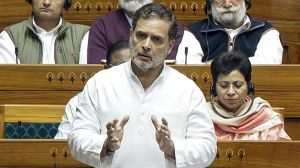Catastrophe in Pakistan
Whom the gods wish to destroy, they first make them mad. General Musharraf has done what no military ruler in Pakistan has been mad enough even to attempt.

Whom the gods wish to destroy, they first make them mad. General Musharraf has done what no military ruler in Pakistan has been mad enough even to attempt. In effect he has declared a war on the Constitution and the fundamental rights of the people, on the press and the nation’s top judiciary. What is the justification? The usual pretext of threat to national security. In reality, it is to pre-empt a likely adverse verdict by the Supreme Court against the general in his pending election case. Musharraf cannot tolerate an independent judiciary striking down orders that are unconstitutional. He regards this as constant interference by the judiciary.
The most obnoxious part is the emasculation of the Supreme Court and the humiliation heaped upon Chief Justice Iftikhar Chaudhry, who has been forced to vacate his office and is under house arrest. Justice Hameed Dogar, fourth in line of seniority, has been appointed chief justice by Musharraf under the new provisional constitutional order. Promptly Chief Justice Dogar cancelled the hearing of the cases pending in the Supreme Court against Musharraf. The cat is out of the bag.
Judges are required to take oath under the new provisional constitutional order. No self-respecting judge will do so. But alas, there will be obliging judges who will replace them and do the general’s bidding. And all these condemnable actions are to keep the general in the saddle. What a catastrophic folly! What a suicidal blunder!
The US’s staunch ally in the war on terror has turned out to be its staunch enemy on civil liberties and democracy. The US has limited options. It cannot afford to cut off military aid to Pakistan because that would enable the jihadi and pro-Taliban elements to gain ground, a worrying development for us. However, the US must act swiftly and press for the release of Chief Justice Chaudhry, Pakistani lawyers, media persons and human rights activists. It should also press for early free and fair elections under international supervision.
Globalisation and human rights
Lord Chris Patten in his recent erudite lecture on globalisation frankly conceded that globalisation had not helped every country, nor reduced inequity within every society that had benefited from it. And therein lies the rub. The stark reality is that in the wake of globalisation, multinational corporations, in view of their vast resources and influence and the wide powers they wield, have become dominant actors not only economically but also politically. Whichever school of thought one subscribes to vis-à-vis globalisation, the imperatives of social justice are indispensable. If vast disparities in wealth and income widen because of globalisation then there is resultant lack of social justice.
Ultimately globalisation in itself is neither good nor bad. It depends on what is made of it. However, utmost vigilance is necessary to prevent globalisation from accentuating marginalisation of the weak and the vulnerable and impinging upon the socio-economic rights of our people. In the apt words of Pope John Paul, it must be ensured that the winner in this process of globalisation “will be humanity as a whole, not just a wealthy elite that controls science, technology, communication and the planet’s resources to the detriment of the vast majority of its people”.
Mind your judicial language
Judge Peter Leask of the Provincial Court, British Columbia, during closing arguments at a drug trial indulged in profane language in a courtroom packed with reporters, lawyers and members of the public, including a school group. He used the f-word four times, along with “Oh, shit” and “goddamned”. The Canadian Judicial Council, which hears complaints against all federally appointed judges, reprimanded the erring judge. It said that Judge Leask’s language was offensive and brought discredit on the judiciary. It stressed that judges have an obligation, at all times, to ensure that decorum is maintained in the courtroom. However in light of the judge’s unambiguous apology and his commitment that such actions would not be repeated in future, the matter was dropped.
Judges accustomed to use coarse language, particularly in their native lingo, should take note.
- 01
- 02
- 03
- 04
- 05































